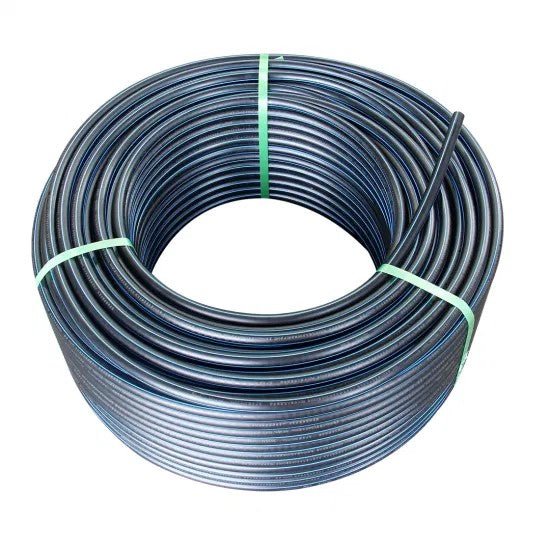American Plastics HDPE Pipe for Oilfield: Efficiency in Harsh Environments
Wiki Article
Comprehending the Trick Benefits of HDPE Pipe for Water and Wastewater Monitoring
Making use of HDPE pipe in water and wastewater monitoring provides many benefits that warrant factor to consider. Its phenomenal toughness and lengthy life expectancy make it a recommended choice for numerous projects. In addition, the product's resistance to rust and chemical damages enhances its dependability in different atmospheres. The benefits prolong past simply long life and resistance. hdpe pipe in stock Midland TX. Discovering its cost-effectiveness and ecological impact reveals much more engaging reasons for its extensive fostering in modern-day infrastructurePhenomenal Sturdiness and Longevity

HDPE pipeline sticks out for its phenomenal sturdiness and long life, making it a recommended choice in water administration systems. Created from high-density polyethylene, these pipes can withstand considerable pressure and tension, making sure reputable performance in time. Their durable nature allows them to withstand extreme environmental problems, consisting of temperature level variations and dirt motions, which can trigger various other materials to stop working.
The life-span of HDPE pipes typically goes beyond half a century, providing a cost-effective remedy for towns and markets alike. In addition, the product's lightweight buildings simplify setup, lowering labor costs and durations. This longevity decreases the requirement for constant repair services or replacements, even more enhancing its economic charm.
In water administration applications, the reliability of HDPE pipelines suggests fewer interruptions and enhanced service continuity, making them integral to lasting facilities development. The mix of durability and long life solidifies HDPE's duty as a keystone in reliable water administration options.

Resistance to Corrosion and Chemical Damages
While numerous products yield to corrosion and chemical damages in time, HDPE pipelines display remarkable resistance, making them suitable for various water administration applications. This strength comes from the molecular framework of high-density polyethylene, which is inherently non-reactive and does not rust like steels or deteriorate from direct exposure to severe chemicals. As an outcome, HDPE is very effective in atmospheres with hostile substances, such as wastewater systems that may have acids, bases, and organic solvents.
Furthermore, HDPE pipelines can endure ecological factors such as soil acidity and saline problems, better boosting their viability for diverse applications (Texas hdpe pipe manufacturer). Their ability to preserve architectural honesty with time lowers the threat of leakages and failings, which is critical in making certain the safety and reliability of water circulation and wastewater monitoring systems. The resistance to deterioration and chemical damages noticeably contributes to the total performance and durability of HDPE piping options.
Cost-Effectiveness and Economic Benefits
When considering the economic ramifications of water administration systems, the cost-effectiveness of HDPE pipes comes to be obvious. These pipelines use reduced installment and maintenance expenses compared to conventional materials like steel or concrete. Their lightweight nature simplifies transport and installation, causing lowered labor costs. Additionally, HDPE pipelines show a lengthy life-span, frequently exceeding half a century, which translates to less replacements and long-term cost savings.The resistance of HDPE to rust and chemical damage minimizes the requirement for pricey repair services and substitutes. The pipes additionally support reliable water flow, lowering energy expenses connected with pumping systems. By reducing leakages and water loss, HDPE pipes add to considerable financial benefits anonymous for towns and sectors alike. Overall, the first investment in HDPE piping can generate substantial monetary returns over the life expectancy of the water monitoring system, making it a sensible option for lasting framework development.
Environmental Sustainability and Minimized Influence

Versatility and Flexibility in Installation
Due to the fact that of their one-of-a-kind residential properties, HDPE pipes provide remarkable flexibility and flexibility in installment, making them appropriate for a vast array of applications. Their light-weight nature permits simpler handling and transportation, lowering labor expenses and installment time. HDPE pipes can be bent and formed to fit numerous terrains and task demands, which is particularly valuable in testing environments.In addition, their resistance to corrosion and chemical damages permits installment in diverse setups without the need for specialized safety finishings. The capacity to fuse joints produces a continual, leak-free system, enhancing the total integrity and dependability of the installment. HDPE's versatility additionally accommodates ground motion, lowering the risk of damages in locations directory prone to shifting dirt. In general, these attributes make HDPE pipelines not only flexible yet also a recommended choice for water and wastewater monitoring systems.
Regularly Asked Questions
Exactly How Does HDPE Pipeline Contrast to PVC in Water Management Applications?
HDPE pipe uses superior flexibility, resistance to corrosion, and toughness compared to PVC. Its lighter weight promotes easier setup, while its lengthy life-span lowers replacement expenses, making HDPE a favored selection in water monitoring applications.What Is the Life-span of HDPE Pipes Under Common Conditions?
Under regular conditions, HDPE pipelines can have a life-span varying from 50 to 100 years. Their durability and resistance to rust add to their long-lasting performance in different applications, making them a reputable selection for framework.Are HDPE Pipes Recyclable After Their Life Span?
Yes, HDPE pipes are recyclable after their service life. hdpe pipe fittings Midland TX. They can be processed and repurposed into new products, significantly decreasing environmental impact and advertising sustainability within the sector, making them a green selection for piping solutionsWhat Is the Setup Process for HDPE Pipes?
The installation procedure for HDPE pipes entails site preparation, trenching, pipeline blend or mechanical signing up with, backfilling, and pressure screening. Appropriate techniques ensure a long lasting and effective system for delivering water and wastewater efficiently.Can HDPE Piping Be Utilized for Both Potable and Non-Potable Water Solutions?
Yes, HDPE pipelines can be utilized for both potable and non-potable water supply. Their versatility, longevity, and resistance to rust make them suitable for different applications, making certain safe and reliable transport of water in various contexts.Report this wiki page